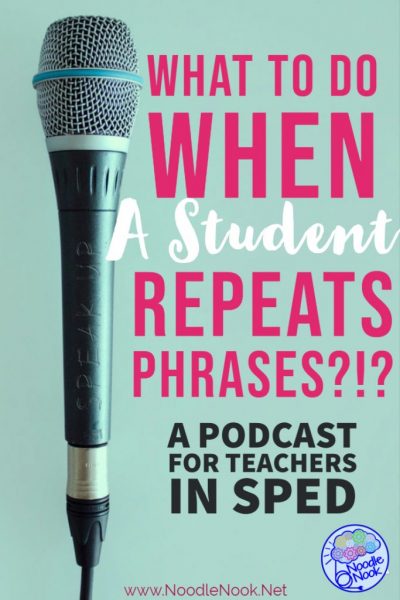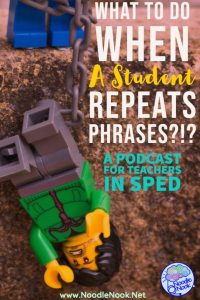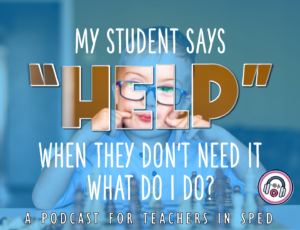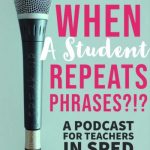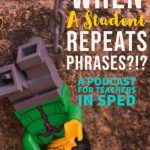What can you do as a SpEd Teacher when your student uses a repeated phrase in your autism classroom… over and over again? This podcast answers a teacher question about a student who repeats the phrase “Help” dozens of times a day… even when he doesn’t need any help!
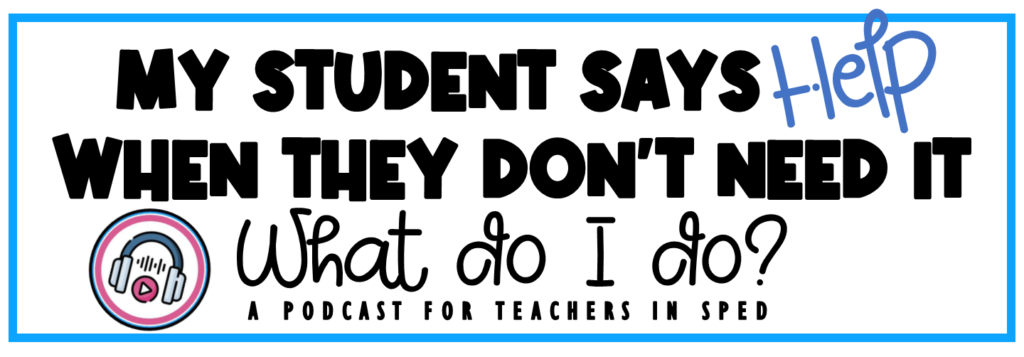
Question from Patty…
First off, it can be challenging to answer questions about specific students that I have never met or seen in action. As with all advice and recommendations, always err on the side of what’s best for your student or child. With that said here’s Patty’s question about a repeated phrase in Autism…
I have a student who has started to repeatedly say ‘Help’ all day long, like an average of 50 plus times a day. He’ll ask for help completing tasks that I’ve watched him doing in the past, like opening his food at lunch and putting his book bag away, independently. He’ll even ask for help in his free time while on the computer and this is a task he is perfectly capable of doing. In my opinion, he’s doing it for attention and I was trying to do planned ignore, which has helped to eliminate some of his behaviors in the past, but I am worried that he will stop asking for help when he really needs it. So… any suggestions on how to deal with this behavior? P.S. He is a 9th grade student in a self contained autism classroom.
-Patty
IEP goals are frequently written to help a student advocate for themselves by asking for help or seeking the assistance of adults. The problem can become, like in Patty’s situation, that a student is using that ‘Help’ tool all the time, even when they don’t need it.
So what can you do when a student asks for help all the time, even when they don’t need it?
Strategies for Dealing with ‘Help’
Planned Ignore will work and I like that Patty mentioned she was using it and it has worked with this student in the past. What else can you do though? With any social or behavior issue for students with significant disabilities, I always suggest these big three:
1: A Social Story
You should always consider a social story for students who are targeting social skills. A well written social narrative that includes a replacement behavior can be the silver bullet in any SpEd teacher’s tool belt. You can see Noodle Nook Social Stories here.
2: A Token System
Again, any special ed teacher or teacher struggling with classroom management and behavior needs a token system for their classroom. That can be classroom wide or just student specific, but consider how you will reward students for doing what is expected. You can read more about strategies on implementing and fading a token board HERE.
In this case, you could also consider using a token system. This can limit how many times a students is allowed to as for help. It’ll also increase the awareness of how many helps are needed. It can also limit the amount of times a teacher has to respond. You would be amazed how this strategy can help students who use a repeated phrase in autism units!
3: Positive Praise
I don’t think enough is said about how motivational positive praise can be, especially when you praise like a Dallas Cowboy Cheerleader on tryout day! Use all the gusto and pizzazz you have to celebrate the behaviors you want and ignore those you don’t.
Even More Strategies
If you are looking for some next level advice, beyond the basics, then you may want to try these strategies to improve the repetitive behavior of your students with Autism.
4: Alternate Phrase
We work hard as teachers to get students to talk and communicate wants and needs. That is especially true in students with Autism or other significant disabilities. It seems like shooting yourself in the foot. To work that hard and then have to get the students to stop talking to much…
So, maybe ‘help’ is too general a phrase. Maybe this student needs another thing to say when he wants to get attention or isn’t sure what to say. You may try a positive phrase like “I’ve got this” or “I can do this”. These can add to his lexicon and will get positive attention with peers and adults.
Try to target these phrases with tasks where you know he is capable of doing them independently (like at lunch or during free time).
5: Practice ‘Help’ Situations
Try putting the student in a situation where he really does need help. Then allow him this opportunity to use the ‘help’ to get real help and solve a real problem.
Something like a computer that isn’t charged or missing silverware at lunch may be a situation where you can better practice using the word ‘Help’. The key here is to not remove the word from his lexicon. You want to help the student synthesize when the word really means.
6: Replace Attention Seeking Behavior
How can this student get positive attention from others in a better way? If this behavior is truly attention seeking behavior, then we need to replace the behavior. We need to find a way for this student to get that attention in a more socially appropriate manner.
It may be that you need to teach him an appropriate social routine. This is so he can get the attention of adults and peers in the classroom the right way. That could be something as simple as a high-5. As long as we can replace the undesired with the desired behavior, then we are golden. Think about what you would rather have him do to get some attention and then teach it to him.
If you are more interested in addressing Attention Seeking Behavior, you can read more here.
Every day you’re not on the Noodle Nook Newsletter email list, you’re missing out on amazing freebies, tips on how to be more successful in a Special Ed classroom, and ideas to work smarter and not harder. Sign up today!
There you go, some ideas on dealing with students who use a repeated phrase in autism classes. As a special ed teacher, repeated phrases in students with Autism or other significant disabilities can be frustrating. Implement these plans to minimize the negative impact and improve behaviors!
Article Citation: [cite]
